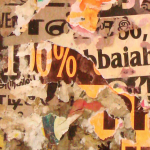2006
Luc Herman and Bart Vervaeck review Marie Laure-Ryan's Narrative as Virtual Reality: Immersion and Interactivity in Literature and Electronic Media. They review the essential characteristics of hypertext to suggest more nuanced ways to understand realism in relation to virtual reality.
2005
Caren Irr reframes the question of private property through fantastic narratives of the commons.
Hanjo Berressem provides both fast-forward and slow-motion readings of Slavoj Žižek's Organs without Bodies: On Deleuze and Consequences.
William Smith Wilson injects the transcendentals of aesthetic illusions into Hardt and Negri's immanent materialism.
Linda C Brigham complicates Hardt and Negri's case for network resistance.
Peter Hare responds to Lori Emerson's review of Walter Benn Michaels.
Eric Dean Rasmussen traces the contours of Hanjo Berressem's rigorous, bi-tempo reading of Organs without Bodies, which finds Žižek's philosophical buggering of Deleuze to be wanting.
William Smith Wilson builds on his earlier ebr essay, "The End of Exemptions of Beauty," with this companion piece.
Nick Spencer argues that the multitude is machinic, even without machines.
Jokes play a fundamental role in Slavoj Žižek's philosophizing. Is Žižek joking when he extols the virtues of Christianity to the Left? Eric Dean Rasmussen analyzes Žižek's pro-Christian proselytizing as attacks on modes of PC-ness - political correctness and perverse Christianity - that sustain an undesirable neoliberalism.
Aron Pease introduces this collection of essays by Linda Brigham, Caren Irr, William Wilson and Nick Spencer with a look at the multitude's programmability.
1999 e-literature award winner John Cayley writes about Saul Bass of classic film title fame. A precursor to language arts innovators Jenny Holzer, Richard Kostelanetz, and Cayley himself, Bass may now be recognized as a poet in his own 'write,' important for a new generation of designwriters creating "graphic bodies of language," moving words and signifying images, in digital environments.
Chris Stroffolino responds to Lori Emerson
Scott Rettberg, responding to "The Pixel/The Line" (section 4 of First Person) wonders whether electronic writing isn't evolving into a subspecies of electronic art, one that uses words as material, 'just as sculptors use clay.'
Lori Emerson reviews The Shape of the Signifier by Walter Benn Michaels.
Now that the First Person essay collection is complete and the case has been made for computer games as a form of narrative, Brian Kim Stefans asks the fundamental questions - concerning what can be read as literature, and what really cannot.
"Playing with play," John Cayley sets ludology on an even playing field with literature, but without literary scholarship's over-reliance on 'story,' 'closure,' and 'pleasure.'
Julie Cupples reviews a retrospective collection of essays by Chandra Mohanty on the geopolitics of gender and race.
The reader steps to the fore in the final section of First Person, reconfigured and ready for interaction.


